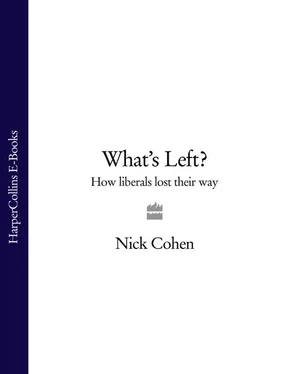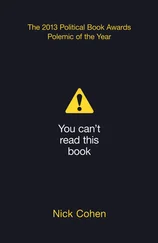Everyone I respected in public life was wildly anti-war, and I was struck by how their concern about Iraq didn’t extend to the common courtesy of talking to Iraqis. They seemed to have airbrushed from their memories all they had once known about Iraq and every principle of mutual respect they had once upheld.
I supposed their furious indifference was reasonable at the time. They had many good arguments that I would have agreed with in other circumstances. I assumed that once the war was over they would back Iraqis trying to build a democracy while continuing to pursue George W. Bush and Tony Blair to their graves for what they had done. I waited for a majority on the liberal-left to offer qualified support for a new Iraq, and I kept on waiting because it never happened – not just in Britain, but also in the United States, in Europe, in India, in South America, in South Africa … in every part of the world where there was a recognizable liberal-left. They didn’t think again when thousands of Iraqis were slaughtered by ‘insurgents’ from the Baath Party, which wanted to re-establish the dictatorship, and from al-Qaeda, which wanted a godly global empire to repress the rights of democrats, the independent-minded, women and homosexuals. They didn’t think again when Iraqis defied the death threats and went to vote on new constitutions and governments. Eventually, I grew tired of waiting for a change that was never going to come and resolved to find out what had happened to a Left whose benevolence I had taken for granted.
All right, you might say, but the reaction to the second Iraq war is not a good enough reason to write a book. The American and British governments sold the invasion to their publics with a false bill of goods and its aftermath was a bloody catastrophe. It was Utopian to hope that leftists and liberals could oppose George W. Bush while his troops poured into Iraq – and killed their fair share of civilians – while at the same time standing up for the freedoms of others. There was too much emotional energy invested in opposing the war, too much justifiable horror at the chaos and too much justifiable anger that the talk of weapons of mass destruction turned out to be so much nonsense. The politically committed are like football fans. They support their side come what may and refuse to see any good in the opposing team. The liberal-left bitterly opposed war, and their indifference afterwards was a natural consequence of the fury directed at Bush.
It is a fair argument, which I’ve heard many times, although I wince at the implied passivity. People don’t just react to a crisis: they choose how they react. If a man walks down the street trying to pick a fight, you can judge those he confronts by how they respond. Do they hit back, run away or try to calm him down? The confrontation is not of their making, but they still have a choice, and what choice they make reveals their character and beliefs.
If you insist on treating the reaction to the second Iraq war as a one-off that doesn’t reveal a deeper sickness, I’ll change the subject. This book isn’t all about Iraq or mainly about Iraq. It raises questions about morbid symptoms on the liberal-left which were there before George W. Bush and Tony Blair came to power and show every sign of flourishing long after they have gone.
Why is it that apologies for a militant Islam which stands for everything the liberal-left is against come from the liberal-left? Why will students hear a leftish post-modern theorist defend the exploitation of women in traditional cultures but not a crusty conservative don? After the American and British wars in Bosnia and Kosovo against Slobodan Milosevic’s ethnic cleansers, why were men and women of the Left denying the existence of Serb concentration camps? As important, why did a European Union that daily announces its commitment to the liberal principles of human rights and international law do nothing as crimes against humanity took place just over its borders? Why is Palestine a cause for the liberal-left, but not China, Sudan, Zimbabwe, the Congo or North Korea? Why, even in the case of Palestine, can’t those who say they support the Palestinian cause tell you what type of Palestine they would like to see? After the 9/11 attacks on New York and Washington why were you as likely to read that a sinister conspiracy of Jews controlled American or British foreign policy in a superior literary journal as in a neo-Nazi hate sheet? And why after the 7/7 attacks on London did leftish rather than right-wing newspapers run pieces excusing suicide bombers who were inspired by a psychopathic theology from the ultra-right?
In short, why is the world upside down? In the past conservatives made excuses for fascism because they mistakenly saw it as a continuation of their democratic right-wing ideas. Now, overwhelmingly and everywhere, liberals and leftists are far more likely than conservatives to excuse fascistic governments and movements, with the exception of their native far-right parties. As long as local racists are white, they have no difficulty in opposing them in a manner that would have been recognizable to the traditional left. But give them a foreign far-right movement that is anti-Western and they treat it as at best a distraction and at worst an ally.
A part of the answer is that it isn’t at all clear what it means to be on the Left at the moment. I doubt if anyone can tell you what a society significantly more left wing than ours would look like and how its economy and government would work. (Let alone whether a majority of their fellow citizens would want to live there.) Socialism, which provided the definition of what it meant to be on the Left from the 1880s to the 1980s, is gone. Disgraced by the communists’ atrocities and floored by the success of market-based economies, it no longer exists as a coherent programme for government. Even the modest and humane social democratic systems of Europe are under strain and look dreadfully vulnerable.
It is not novel to say that socialism is dead. The argument of this book is that its failure has brought a dark liberation to people who consider themselves to be on the liberal-left. It has freed them to go along with any movement however far to the right it may be, as long as it is against the status quo in general and, specifically, America. I hate to repeat the over-used quote that ‘when a man stops believing in God he doesn’t then believe in nothing, he believes anything’, but there is no escaping it. Because it is very hard to imagine a radical left-wing alternative, or even mildly radical alternative, intellectuals in particular are ready to excuse the movements of the far right as long as they are anti-Western.
It is not only the lost souls of the old far left who are scurrying rightwards, but mainstream liberal-leftists, although for different reasons. The mainstream didn’t only argue about economics but had a parallel programme from the Sixties on to promote equal rights for women, homosexuals and ethnic minorities. And on that, the liberal-left won spectacularly. Although prejudice with its attendant miseries continues in the rich world, the liberal-left achieved the political victory of securing equal legal rights in law for groups which had been despised and persecuted for millennia. But victory is a kind of death because it leaves you with no purpose once the old battles are over. Despite their talk of supporting equality, mainstream liberals found it uncomplicated to make excuses for anti-liberal movements because the triumph of their philosophy carried with it a poisonous and despairing legacy. If the dictatorial leaders of a foreign state or radical movement, or the usually unelected leaders of a ‘community’ or religious group said that their culture demanded the oppression of women and homosexuals, for example, twenty-first-century liberals were tripped over by the thought that it was racist to oppose them. They could be all for the emancipation of women in London, Paris and New York while indifferent to the misogynies of the Middle East, Africa and Asia.
Читать дальше





![Джонатан Димблби - Barbarossa - How Hitler Lost the War [calibre]](/books/385421/dzhonatan-dimblbi-barbarossa-how-hitler-lost-the-w-thumb.webp)






